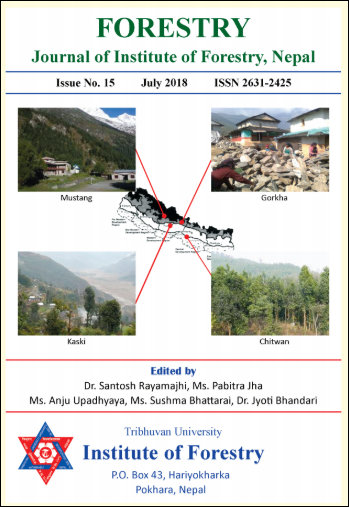Attempts of Recentralization of Nepal’s Community Forestry
DOI:
https://doi.org/10.3126/forestry.v15i0.24925Keywords:
recentralization, bureaucracy, expert knowledgeAbstract
Nepal’s community forestry is regarded as a milestone in decentralized forest management, several researchers agree on the livelihoods and environmental outcomes from the community forest, however, the outcomes in governance perspective is rarely questioned. Through the review of the literature, policy documents and decrees, and questionnaire survey in nine community forest user groups in western hills of Nepal; we demonstrate how recentralization is taking place in community forestry in lieu of decentralized policies and discuss their implications on limiting the role of local forest users in forest management. Recentralization through the lens of inventory requirements has been observed in community forestry through (i) the formulation of strategies and policies favorable to increase the role of forest bureaucrats in community forestry (ii) changing the use of technical knowledge patterns and requirements and (iii) increased bureaucratic power. The increased technical knowledge in the form of inventory based forest management planning is found to be the major step in curtailing the devolved rights and increasing the bureaucratic power. Formulation of strategies, guidelines, circulars and policy intervention create a favorable environment for the bureaucrats to exercise more power compared to the autonomy provided by Forest Act 1993. The highly influential upward accountability in community forestry thus questions the modality of decentralized forest management in Nepalese community forestry.
Downloads
Downloads
Published
How to Cite
Issue
Section
License
This license enables reusers to distribute, remix, adapt, and build upon the material in any medium or format, so long as attribution is given to the creator. The license allows for commercial use.




